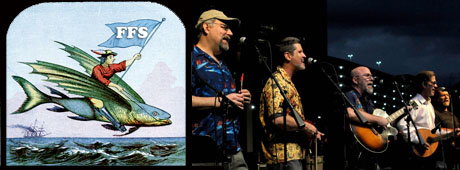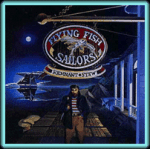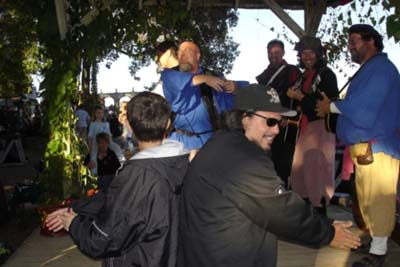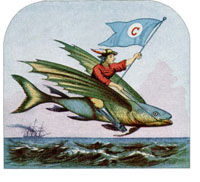
This album is available at Amazon.com
Click here to order
• “Loch Ness Monster” (Greg Henkel and Jim Henkel)
The album opens with the wonderfully dark ode to the creature lurking beneath the murky waters of Loch Ness. Here the beast is less the benign and almost dopey plesiosaur used to sell trinkets to tourists and much more the accursed beast with “Huge red eye, long sharp tooth / slicing knives, ragged spines” which will drag you from the banks and tear you to pieces despite your screams and struggles. Nessie, indeed.
• “Irish Rover” (traditional)
An old favorite, it tells the tale of the ill-fated voyage of the Irish Rover, sailing from Cork to New York. After seven years at sea, the measles wiped out the crew and she ran aground in the fog, leaving a single survivor to tell the tale. Greg Henkel replaced the second verse, which introduces the crew, with one describing the Flying Fish Sailors themselves:
There was fighting Jay Lee, none more surly than he
There was Jimbe from County Montrose
There was mighty Mitch Lawyer, stood seven feet tall
There was Joseph Linbeck and his nose
There was Bouzouki Jim playing a mandolin
And Greg Henkel prone to falling over
And this crew of the doomed played a Flying Fish tune
As we sailed on the Irish Rover!
• “The Flupandemic” (Greg Henkel)
Only the Flying Fish sailors could come up with an up-beat and happy song about the world-wide flu epidemic that killed millions in the first part of the twentieth century. They sing gleefully about the deaths of soldiers and nurses and postmen and families from America to England to the far corners of the world all secumbing to the pandemic.
• “The Good Ship Calabar” (traditional)
Also known as “The Calabar” and “The Cruise of the Calabar,” this fast and funny song tells of the adventures of the one horse-power (literally) coal barge The Calabar. In this version, the narrator is an old Lisbon tar, but other regional variations include Irish or British. Everything that can go wrong does, and the crew falls overboard to be rescued by a local farmer. It’s enough to convince anyone to give up sailing and “go by the bloody train.”
• “The Cat Came Back” (traditional)
Another rendition of the Harry S. Miller song about old Mr. Johnson’s yellow tom cat. While the words are the same as the version on the Flying Fish Sailors’ debut album, there are subtle differences in the arrangement that show the evolution of the band. They are much more playful in this version, especially with the inclusion of background vocals at the transitions between verse and chorus.
• “The Wharton UFO” (Greg Henkel)
Wharton, Texas, is just about the last place on Earth an alien would want its spacecraft to crash, as they learn when a good ol’ boy comes upon their wreck. After they abduct him and begin their various probings and measurements, he loses his “temper for those three foot bastards with their big black almond-shaped eyes,” and turns the tables on them. Rumor has it they can still be seen mowing his lawn and teleporting him beers on his front porch down in Wharton.
• “Fire Maringo” (traditional)
A traditional cotton screwing shanty from a time when, with the approach of winter, Irish crews would desert their Western Packet ships to head south to work in the cotton stowing ports like Mobile or New Orleans.
• “The Rivers of Texas” (traditional circa 1900)
A soft traditional American folk song listing and describing the rivers of Texas, but always returns to the Brazos, where the singer’s heart was broken.
• “Crawdad Man” (lyrics by Greg Henkel)
Sung to the tune of the “Spider-Man” theme by Paul Francis Webster and J. Robert Harris, Crawdad Man takes the Flying Fish Sailors back their roots to examine their favorite crustacean, the crawdad. Now he’s a superhero, lending a gamma ray-enhanced leg (“cause he can’t lend a hand”) to those in need. This is most likely the only song you’ll find that contains the word cheliped (the legs with large grasping claws on a crawfish) in its lyrics.
• “Ode to the Lima Bean” (lyrics by Cynthia Lee, music by Greg Henkel)
Children around the world should be overjoyed to discover that far from being “healthy” and “good for you,” the lima bean is the worst scourge known to man. As this ode explains, it is responsible for everything from Original Sin and the explusion from Eden to the extinction of the dinosaurs and the Black Plague.
• “Haul U-Haul Haul” (Greg Henkel)
There have been long-haul shanties and halyard shanties, shanties for pretty much any activity aboard a sailing ship. Now, in the spirit of their mowing shanty Mow Johnny Mow, the Flying Fish Sailors present another shanty adapted to the modern day: the moving shanty. The song tells of the horrors of moving yourself with a 27-foot truck from the best known rental company. The lesson learned in the end: “Well the next time I move I’ll just buy new furniture.”
Lest you think the band is advising against the use of a particular truck rental company: “Greg says that it should be noted that he has personally rented U-Haul® equipment on many occasions, and that in his experience, it has proven to be extremely reliable.”
• “King of the Cannibal Islands” (traditional)
The Flying Fish Sailors return to the theme of cannibalism with this playful song that’s right up their alley. A crew sailing for Botany Bay is cast away in the Cannibal Islands, where they manage to get along quite well with the King; one of them even marries his daughter, the Princess Wishy-Wa.
• “Roswell” (Greg Henkel and Jim Henkel)
Roswell, New Mexico. Icon of the joint obsessions with UFOs and conspiracy theories. This song tells the tale of a witness to the crashed spacecraft on the farm outside of Roswell. He explains everything he’s seen and knows to be true despite the warnings of men with steel hats and the men in black with wires coming out of their heads. And in the end, though he dares not return, he still longs for “enigmatical,” “problematical” Roswell.
• “American Woman” (Randy Bachman, Burton Cummings, Gary Peterson, Michael Kale)
The Flying Fish Sailors add their own sound to this classic by The Guess Who. The result is rather reminiscent of “Weird Al” Yankovic’s “Ukranian Woman” parody.
• “Loch Ness Monster” (heavy metal version)
The album closes with a bonus track. Though the words are the same, this version of Loch Ness Monster shows that the band has a broader range that extends into modern musical styles. The darker, dirge-like tune and lyrics fit particularly well with the deep electric riffs that are a hallmark of today’s metal.




 Our third album; a collection of folk music for the nineties!
Our third album; a collection of folk music for the nineties!
 Download this recording for free!
Download this recording for free! 


 Our second album is now available for download. And it’s FREE!
Our second album is now available for download. And it’s FREE! The band has been together for over 16 years now. It’s odd to think about the events that lead to the forming of the band. Odd to think about the naming of the band.
The band has been together for over 16 years now. It’s odd to think about the events that lead to the forming of the band. Odd to think about the naming of the band.